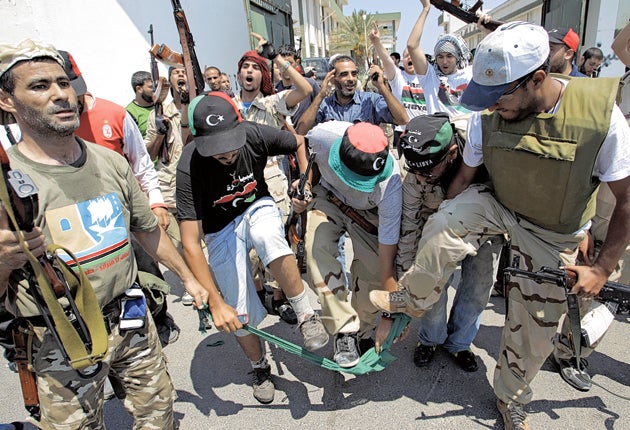How a long, hard struggle suddenly raced to a climax

In January 1942, the tanks of Montgomery's Eighth Army rolled on to the streets of Tripoli. They arrived two days early, unopposed. On Sunday night, Libya's rebels entered the same city – without tanks, but also uncontested and even further ahead of schedule. Their convoys drove easily through a defensive perimeter where heavily armed units of the Khamis Brigade, commanded by one of Muammar Gaddafi's sons, should have been lobbing rockets. Others walked into the brigade's barracks, seizing a store of arms. And then, firing scarcely a shot in anger, crowds entered Green Square and raised the old monarchy's flag.
Colonel Gaddafi's forces have not dissolved. Sirte and large parts of the Fezzan region may be in their hands and Tripoli itself is far from liberated. But this is their last stand and it will surely be over in days. Why did regime units collapse into the capital, having spent six months fighting a ruthless campaign?
It is hard to distinguish causes of the tipping point from the collapse itself. After Zawiyah was taken last week, a key coastal road from Tunisia to Tripoli was severed. The sense of encirclement heightened after the fall of Zlitan and Gharyan, to the east and south. This week was also the culmination of Nato's transformation into the rebel air force. The alliance overwhelmingly focused its efforts on these vulnerable points.
The relentless pounding of the Gaddafi compound would also have disrupted command and control. This, in concert with unexpected moves like the amphibious assault on Tripoli launched from Misrata, would have complicated the security force's efforts to co-ordinate a defence.
But the TNC also played a crucial role in orchestrating the operation like a carefully controlled demolition. For months it had insisted that it was facilitating armed underground activism in Tripoli and that it was liaising with regime functionaries. Both of these claims now look credible.
Only a week ago, a captured Libyan intelligence officer warned that 70 per cent of Tripoli's population backed the government. That figure was a sham. The promised armed volunteers have melted away. It is difficult to imagine that they would form the backbone of a viable insurgency.
The writer is an associate fellow of the Royal United Services Institute
Join our commenting forum
Join thought-provoking conversations, follow other Independent readers and see their replies
Comments
Bookmark popover
Removed from bookmarks